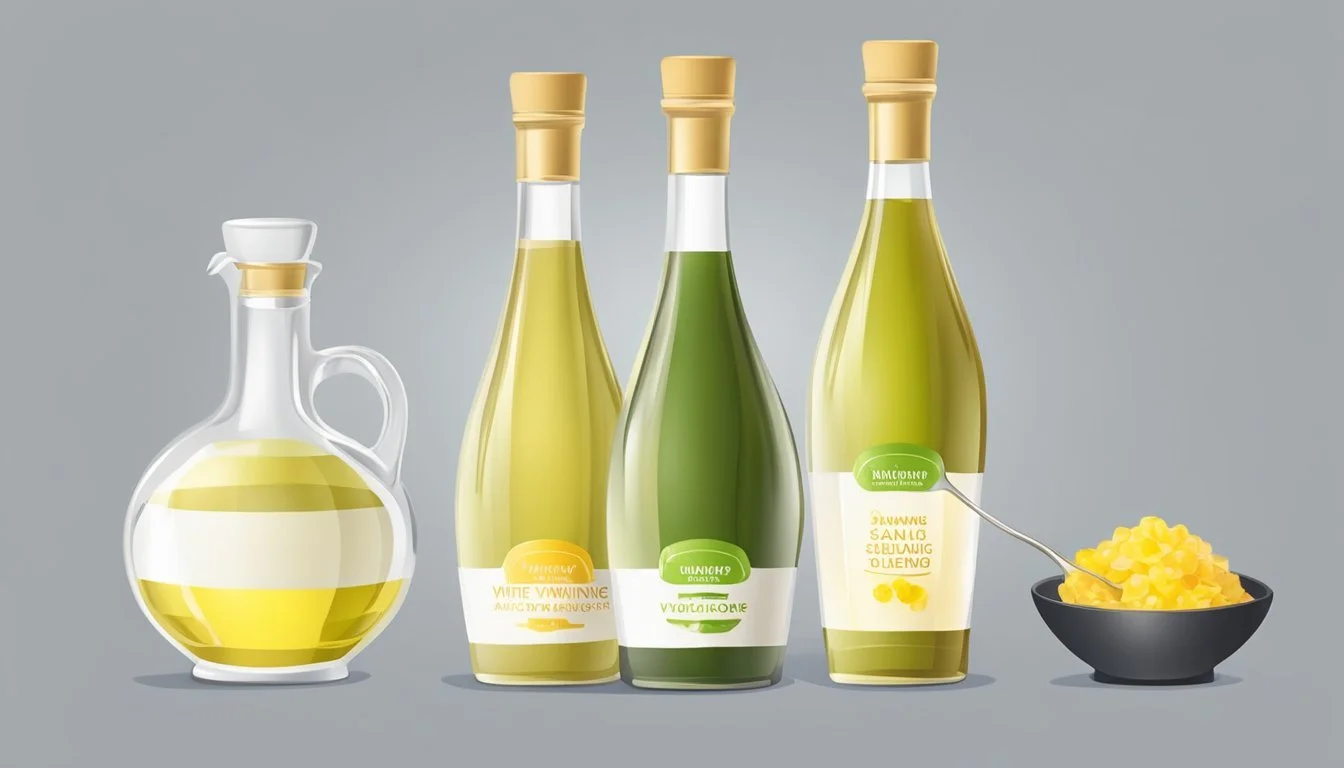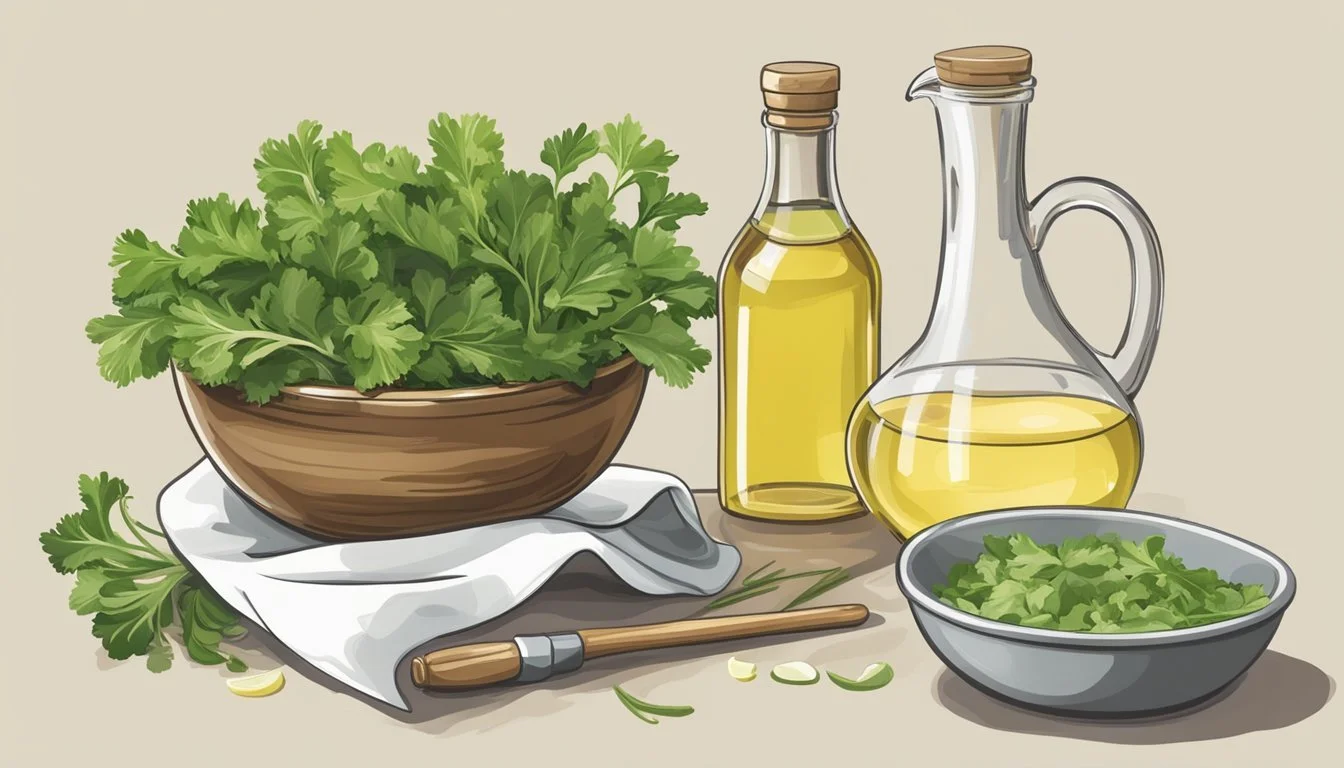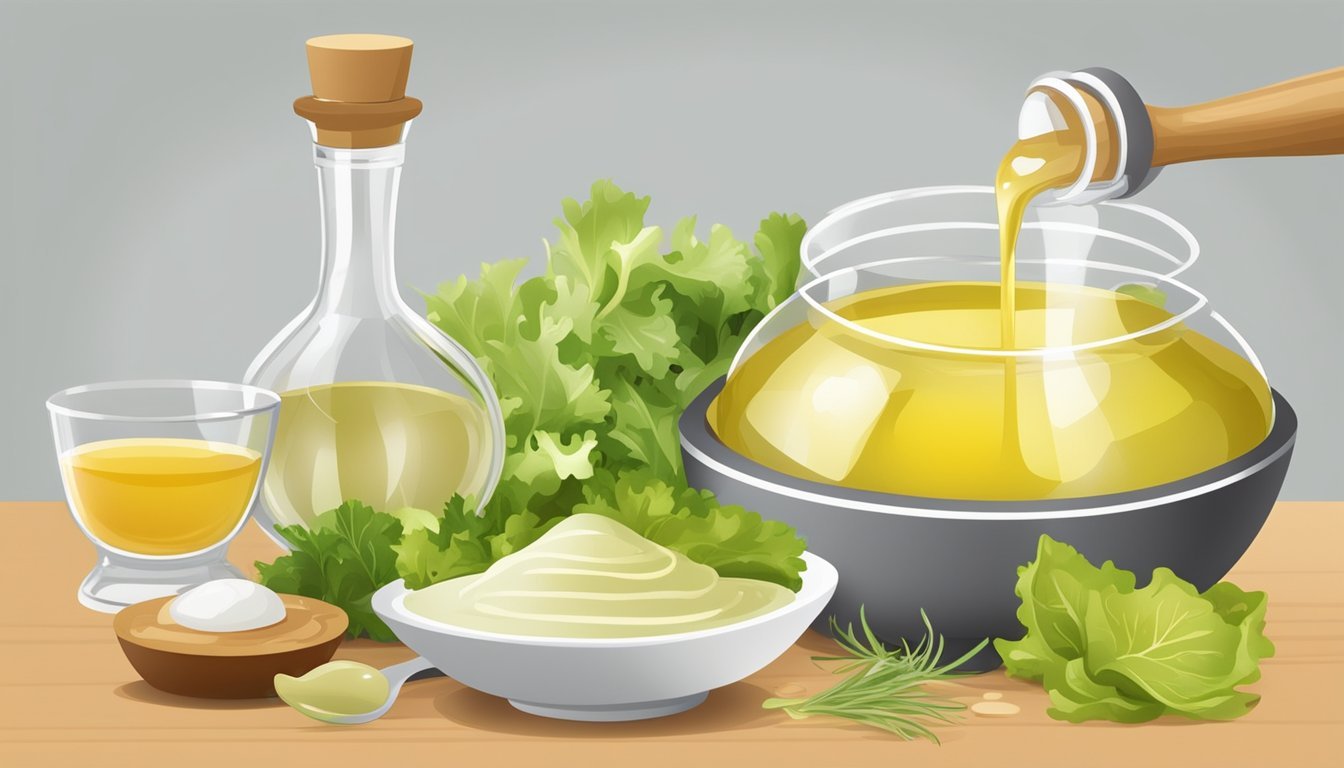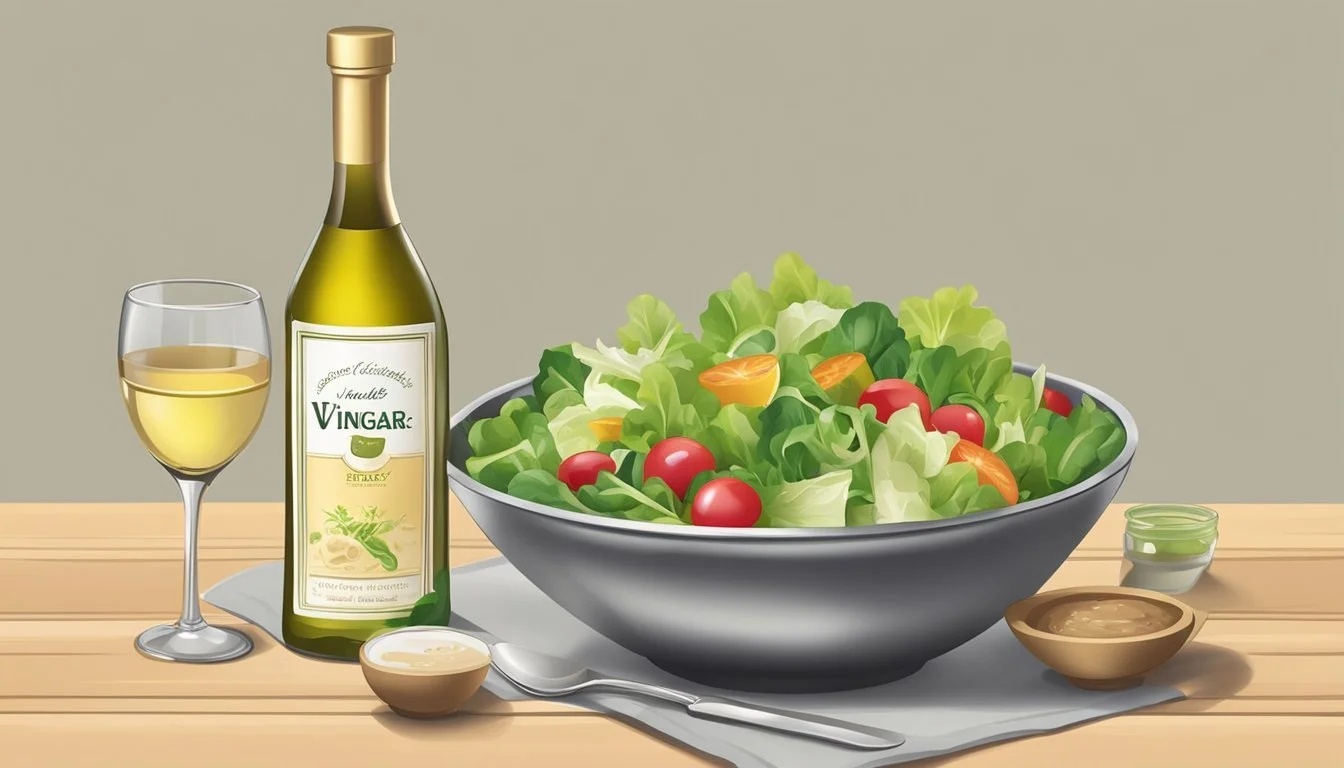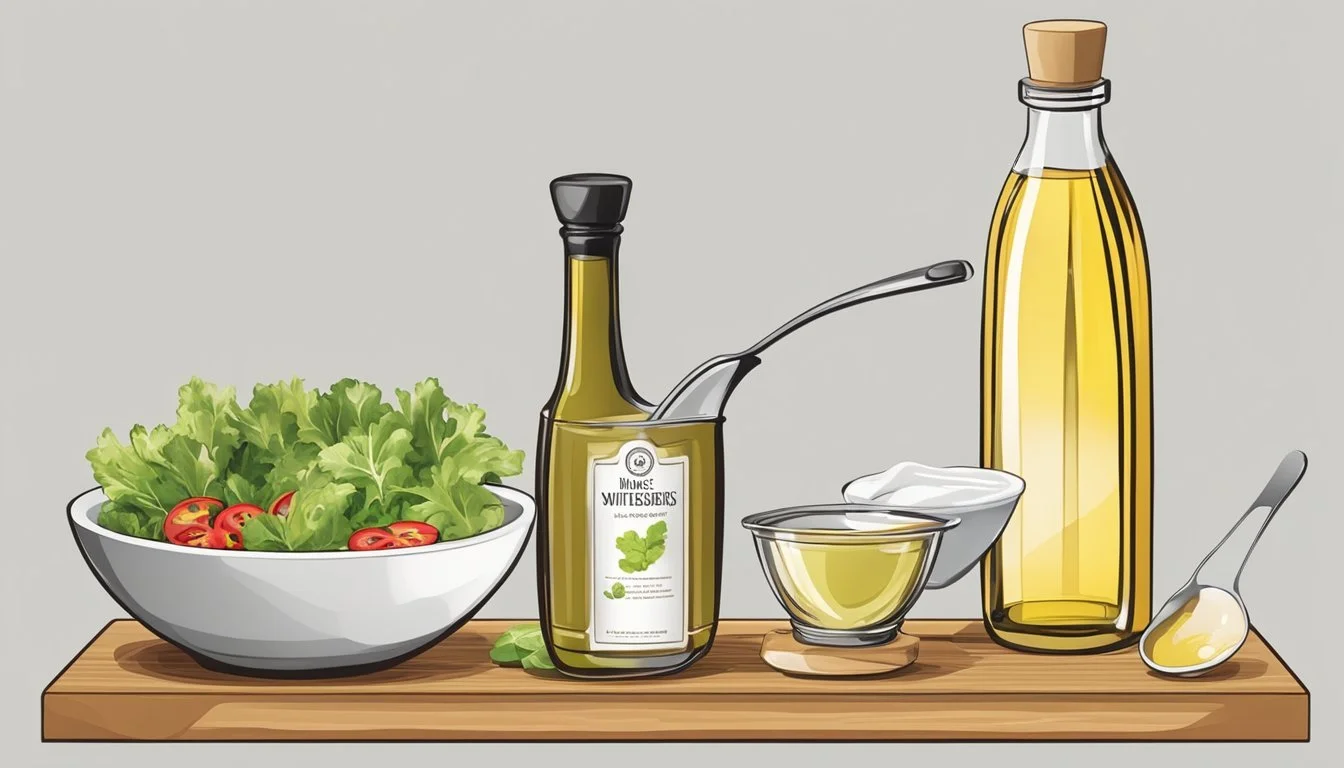How to Substitute White Wine Vinegar for Champagne Vinegar in Dressings
A Simple Swap Guide
When it comes to creating dressings with a bright and tangy flavor, champagne vinegar is often a preferred ingredient. Its light and delicate taste adds a subtle punch to vinaigrettes without overpowering the salad's fresh ingredients. However, champagne vinegar may not always be accessible or within the budget for everyone. White wine vinegar presents a practical alternative with its similar fruity and tangy flavor profile that can mimic the distinct qualities of champagne vinegar quite effectively in dressings.
Utilizing white wine vinegar as a substitute for champagne vinegar in salad dressings requires a one-to-one ratio, making the switch simple and convenient. Both vinegars share a comparable acidity level and a hint of sweetness, which ensures that the end result retains the balance of flavors expected in the original recipe. This substitution works seamlessly in most recipes, preserving the desired harmony between the vinegar's brightness and the other components of the dressing.
For those looking to maintain the nuanced essence of champagne vinegar, adding a touch of water and a pinch of sugar to white wine vinegar can further refine the substitute to taste. This tweak allows the white wine vinegar to more closely resemble the lighter and slightly less acidic nature of champagne vinegar, ensuring that the dressing achieves the right flavor profile. Whether used in creamy emulsifications or light vinaigrettes, white wine vinegar proves to be a reliable stand-in for its more luxurious counterpart.
Understanding Acidity and Flavor Profiles
When substituting vinegars, especially in dressings, it is crucial to consider both the acidity levels and the flavor characteristics. This ensures the end result retains a balance similar to the original recipe.
Acidity Levels in Vinegars
Vinegars are aqueous solutions of acetic acid, typically ranging from 4% to 7% acidity. White wine vinegar and champagne vinegar both fall within this range, yet they have subtle differences. White wine vinegar tends to have a slightly higher acidity level compared to champagne vinegar, which usually contains around 5-6% acetic acid. It's important to match the acidity when substituting one for the other to maintain the dressing's intended tanginess and brightness.
Flavor Characteristics of White Wine and Champagne Vinegars
White Wine Vinegar: Known for its sharpness, white wine vinegar brings a zesty acidity to dressings. It has a robust flavor profile that can complement hearty ingredients and stand up to bold spices.
Champagne Vinegar:
Fruity Flavor: It is milder than white wine vinegar, with a delicate, subtly sweet fruity flavor.
Aroma: The aroma is less pungent and more nuanced, carrying notes of the Champagne from which it is made.
In dressings, matching the flavor intensity and the nuanced sweetness of champagne vinegar with white wine vinegar might require a slight reduction in the quantity used or the addition of a sweetening agent to achieve a similar profile.
Best Vinegar Substitutes for Champagne Vinegar
When dressing recipes call for champagne vinegar and none is available, one can confidently use certain alternatives that offer a similar acidity and flavor profile. This section specifically focuses on substitutes that harmonize well in dressings, ensuring the intended taste is closely matched.
White Wine Vinegar
White wine vinegar stands out as an excellent replacement for champagne vinegar due to its similar flavor and acidity. One should use it in a 1:1 ratio. Its slightly more robust profile can be tempered, if necessary, by diluting with water.
Substitution: Use an equal amount of white wine vinegar for champagne vinegar
Flavor Profile: Comparable to champagne vinegar with a slightly stronger tang
Apple Cider Vinegar
Apple cider vinegar offers a fruitier note which can complement dressings where a subtle fruit undertone is desirable. It is slightly sweeter and less sharp than champagne vinegar, so some may prefer to mix it with a bit of water or add a dash of sugar if a closer match is desired.
Substitution: Substitute equal parts, adjust sweetness if needed
Flavor Profile: Fruity, sweet, less potent
Rice Wine Vinegar
For a milder substitute, rice wine vinegar provides a delicate flavor that doesn't overpower a dressing. Its low acidity is beneficial in recipes that require a subtle, sweet vinegar component. However, it's worth noting that its sweetness and mildness may not be an exact match for the sharpness of champagne vinegar.
Substitution: Consider using slightly less than the recipe calls for
Flavor Profile: Sweet, mild acidity compared to champagne vinegar
Special Considerations for Dressings and Marinades
When substituting white wine vinegar with champagne vinegar in dressings and marinades, careful adjustments are necessary to maintain the desired flavor profile without overpowering the dish.
Maintaining the Balance of Flavors
In dressings and marinades, the harmony between acidity, oil, and flavoring agents is crucial. Champagne vinegar is noted for its delicate and slightly fruity flavor, which is less assertive than that of white wine vinegar. To maintain this balance when using champagne vinegar in place of white wine vinegar:
Use a 1:1 ratio for a straightforward substitution, understanding that the slightly different flavor profiles of the vinegars will be evident.
Taste and adjust the dressing or marinade, adding more champagne vinegar incrementally if a more pronounced tangy flavor is desired.
Adjusting Sweetness and Tanginess
Champagne vinegar typically has a subtle sweetness and less tanginess compared to white wine vinegar, which may alter the intended flavor of a dressing or marinade.
For salad dressings specifically:
If the recipe requires additional sweetness, one may opt to maintain the same level of champagne vinegar or add a pinch of sugar to compensate.
To achieve a similar level of tanginess to white wine vinegar, one might need to slightly increase the volume of champagne vinegar or integrate a squeeze of lemon juice for additional acidity.
Substitution Ratios and Techniques
When substituting white wine vinegar for champagne vinegar in dressings, one should focus on maintaining the balance of acidity and flavor that the original recipe intends.
Standard Vinegar Substitution Ratios
To replace champagne vinegar with white wine vinegar, the substitution ratio is 1:1, meaning if the recipe calls for one tablespoon of champagne vinegar, one should use one tablespoon of white wine vinegar. This ratio ensures that the acidity level in the dressing remains consistent.
Champagne Vinegar: 1 tablespoon
White Wine Vinegar: 1 tablespoon
Techniques for Achieving Desired Flavor
To replicate the slightly milder and subtly sweeter profile of champagne vinegar, consider adding a pinch of sugar to the white wine vinegar before blending it into the dressing. The color of white wine vinegar is typically a soft golden hue, much like champagne vinegar, which should preserve the visual appeal of the final dressing. However, the chef should be aware that ingredients in different brands of white wine vinegar can vary, so they may want to taste and adjust the dressing as they go.
Add a pinch of sugar to white wine vinegar
Blend the vinegar and sugar thoroughly before adding to the dressing
Taste and adjust the dressing, adding more white wine vinegar or sugar as needed
Alternative Substitutes for Specific Dishes
When substituting white wine vinegar for champagne vinegar, the flavor profile of the dish should be taken into account to ensure the substitute complements the ingredients.
Substitutes in Asian Cuisine
In Asian dishes where balance of flavors is crucial, rice vinegar serves as an excellent substitute for champagne vinegar. It maintains the light and tangy qualities required in dressings for Asian salads (What wine goes well with salads?) and slaws.
For sushi rice: Replace champagne vinegar with rice vinegar in equal parts to achieve the desired tanginess.
Substitutes for Sauces and Glazing
Preparing European sauces and glazes typically calls for a subtle acidity that does not overpower the dish. Apple cider vinegar, with its fruity undertones, can be used to mirror the lightness of champagne vinegar.
For béarnaise sauce: Use apple cider vinegar as a one-to-one substitute.
For meat glazes: A mix of apple cider vinegar and a bit of honey can provide both the sweetness and acidity.
Substitutes for Seafood and Meat Dishes
Certain vinegars can overshadow the delicate flavors of seafood and meats, hence lighter vinegars are recommended. White balsamic vinegar offers a milder taste suitable for these dishes.
For seafood marinades: A diluted version of white balsamic vinegar (mixed with water) will not overwhelm seafood flavors.
For meat dressings: A simple switch to white balsamic vinegar enhances the taste without adding excessive sweetness.
Making Your Own Champagne Vinegar Substitute
To create a substitute for champagne vinegar, one can rely on white wine vinegar as the base due to its comparable flavor and acidity.
Ingredients:
White wine vinegar
Sugar
Water
Instructions:
Mix the Base: Start by mixing together three parts white wine vinegar with one part water. This dilutes the vinegar to mimic the milder taste of champagne vinegar.
Sweeten: Add a small pinch of sugar to the mixture to lend a subtle sweetness that champagne vinegar typically has.
Adjust: Taste the mixture and adjust the ratios of water and sugar as needed. The goal is to achieve a balance similar to that of champagne vinegar: mildly acidic with a slight sweetness.
Ratio Table:
Champagne Vinegar White Wine Vinegar Water Sugar 1 tbsp 3 tsp 1 tsp A pinch
When using this substitute in dressings, one would incorporate it in a 1:1 ratio with the amount of champagne vinegar called for in the recipe. This homemade blend works especially well in vinaigrettes and marinades, where the distinctive qualities of champagne vinegar are desirable but not essential.
In essence, this substitution allows individuals to adapt recipes to their pantry availability while maintaining the integrity of the dish's intended flavors.
Frequently Asked Questions About Vinegar Substitution
When substituting vinegar in dressings, the goal is to match the acidity and flavor profile of the original vinegar. Below are some specific alternatives that can be considered when champagne vinegar is unavailable.
Can I Use Lemon or Lime Juice as a Substitute?
Yes, one can use lemon or lime juice as a substitute for champagne vinegar. These citrus juices share a similar level of acidity and can add a fresh, tangy flavor to dressings.
Lemon juice: best for light, fresh vinaigrettes.
Lime juice: adds a slightly more tropical note.
For substitution: Use a 1:1 ratio when replacing champagne vinegar with lemon or lime juice in recipes.
What About Using Herb, Fruit, or Honey Vinegar?
Herb vinegar: This can introduce complex flavors into a dressing, suitable for recipes that benefit from a herbal note.
Fruit vinegar: If one seeks to add a fruity flavor to the dressing, fruit vinegars (like apple cider vinegar) are an excellent substitute.
Honey vinegar: It adds a sweet and mildly tart flavor, perfect for dressings that call for a subtle sweetness.
For substitution: Replace champagne vinegar with herb, fruit, or honey vinegar in a 1:1 ratio, keeping in mind the additional flavors these vinegars bring to the dish.
Conclusion
When it comes to culinary creations, the quest for the perfect dressing can hinge upon the delicate balance of acidity and flavor. White wine vinegar stands as a versatile and readily available substitute for champagne vinegar in dressings. Chefs and home cooks alike can confidently rely on it to impart a similar fruity and tangy nuance to their dressings.
An ideal ratio for substitution is a straightforward one-to-one exchange, allowing an effortless transition within recipes. It provides a practical solution for those instances where champagne vinegar may not be on hand.
White Wine Vinegar:
Flavor: Fruity and tangy
Acidity: Comparable to champagne vinegar
In the realm of dressings, the alternative should complement the dish without overpowering the original intended flavor profile. Due to its adaptive nature, white wine vinegar does just that, enhancing salads, marinades, and sauces with its own characteristic zest while maintaining the integrity of the dish.
It is essential for users to note the subtle differences in flavor and to adjust recipes slightly if necessary. Such adjustments may include a pinch of sugar for added sweetness or a dash of water to tone down acidity. A careful approach to substitution can yield results that are both delicious and harmonious with the original recipe's intentions.
In summary, white wine vinegar's adaptability makes it a credible stand-in that should be a staple in any culinary enthusiast’s pantry. It ensures that the art of dressing-making remains uninterrupted, no matter the availability of champagne vinegar.

